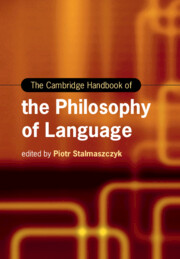Book contents
- The Cambridge Handbook of the Philosophy of Language
- Cambridge Handbooks in Language and Linguistics
- The Cambridge Handbook of the Philosophy of Language
- Copyright page
- Contents
- Figures
- Tables
- Contributors
- Preface
- 1 Philosophy of Language: Definitions, Disciplines, and Approaches
- Part I The Past, Present, and Future of Philosophy of Language
- Part II Some Foundational Issues
- 5 Philosophy of Language, Ontology, and Logic
- 6 Frege’s Legacy in the Philosophy of Language and Mind
- 7 Metasemantics and Metapragmatics: Philosophical Foundations of Meaning
- 8 Internalist Perspectives on Language
- 9 Semantic Content and Utterance Context: A Spectrum of Approaches
- 10 Semantic Minimalism and Contextualism in Light of the Logicality of Language
- Part III From Truth to Vagueness
- Part IV Issues in Semantics and Pragmatics
- Part V Philosophical Implications and Linguistic Theories
- Part VI Some Extensions
- References
- Index
10 - Semantic Minimalism and Contextualism in Light of the Logicality of Language
from Part II - Some Foundational Issues
Published online by Cambridge University Press: 12 November 2021
- The Cambridge Handbook of the Philosophy of Language
- Cambridge Handbooks in Language and Linguistics
- The Cambridge Handbook of the Philosophy of Language
- Copyright page
- Contents
- Figures
- Tables
- Contributors
- Preface
- 1 Philosophy of Language: Definitions, Disciplines, and Approaches
- Part I The Past, Present, and Future of Philosophy of Language
- Part II Some Foundational Issues
- 5 Philosophy of Language, Ontology, and Logic
- 6 Frege’s Legacy in the Philosophy of Language and Mind
- 7 Metasemantics and Metapragmatics: Philosophical Foundations of Meaning
- 8 Internalist Perspectives on Language
- 9 Semantic Content and Utterance Context: A Spectrum of Approaches
- 10 Semantic Minimalism and Contextualism in Light of the Logicality of Language
- Part III From Truth to Vagueness
- Part IV Issues in Semantics and Pragmatics
- Part V Philosophical Implications and Linguistic Theories
- Part VI Some Extensions
- References
- Index
Summary
The “Logicality of language” is the hypothesis that the human language system includes not only a recursive grammar with a compositional semantics, as currently assumed by most semanticists and philosophers of language, but also a natural logic (Abrusán, 2014; Chierchia, 2013; Del Pinal, 2019; Fox, 2000; Fox and Hackl, 2007; Gajewski, 2002). The natural logic, on this view, is part of a computational/inferential system that automatically identifies and filters out expressions that have certain logical properties that make them informationally useless.
- Type
- Chapter
- Information
- The Cambridge Handbook of the Philosophy of Language , pp. 194 - 214Publisher: Cambridge University PressPrint publication year: 2021

